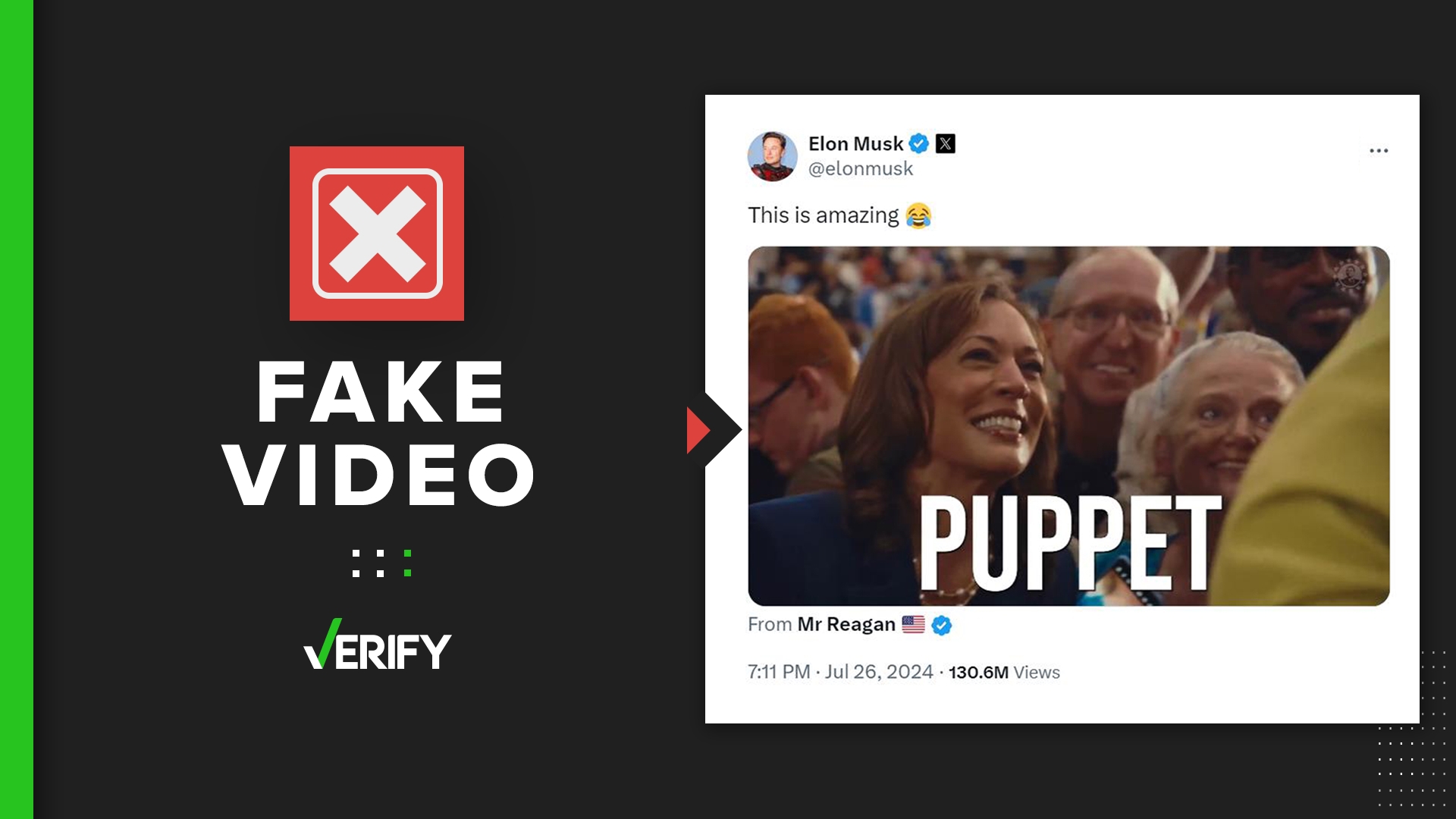Vice President Kamala Harris is now the likely Democratic nominee for president in the 2024 election a little more than a week after President Joe Biden ended his reelection bid.
On July 26, tech billionaire Elon Musk shared a video that looks like a Harris campaign ad on his X account with a caption that says: “This is amazing 😂.” The video has garnered more than 130 million views since it was first posted on X.
In the video, a voice that sounds like Harris says: “I, Kamala Harris, am your Democrat candidate for president because Joe Biden finally exposed his senility at the debate.”
The voice purportedly of Harris says she is a “diversity hire” because she is a woman and a person of color, and it says she doesn’t know “the first thing about running the country.”
Some people who commented on the video questioned whether it was real or created using artificial intelligence. VERIFY previously found that generative AI is being used to spread misinformation in some political advertising and campaigns this election season.
THE QUESTION
Is the Kamala Harris campaign ad shared by Elon Musk real?
THE SOURCES
- Christopher Kohls, conservative pundit and YouTuber who goes by Mr. Reagan
- National Conference of State Legislatures
- Mia Ehrenberg, a Kamala Harris campaign spokesperson
- Hany Farid, Ph.D., professor at the University of California, Berkeley with a joint appointment in electrical engineering & computer sciences and the School of Information
- Robert Weissman, J.D., co-president of Public Citizen
THE ANSWER
No, the Kamala Harris campaign ad shared by Elon Musk is not real.
WHAT WE FOUND
The viral video that Elon Musk shared on X is not a real Kamala Harris campaign ad — it’s a manipulated parody video. The audio added to the video was likely made using generative AI technology to mimic the vice president’s voice to say things she did not say.
The original video was created and posted online on July 26 by Christopher Kohls, a conservative pundit and YouTuber who goes by Mr. Reagan. Kohls disclosed on YouTube and X that the manipulated video is a parody of Harris’ first official campaign ad, which was released on July 25.
“Kamala Harris just posted her first 2024 presidential campaign ad. It’s clean and professional. It’s very well done. So, of course, I had to produce a parody,” Kohls wrote on YouTube.
The YouTube video is labeled as altered or synthetic content and it says that “sound or visuals were significantly edited or digitally generated.” Google, YouTube’s owner, requires creators to disclose content that is meaningfully altered or synthetically generated when it seems realistic.
The parody video, which shows “Harris for President” branding, includes many of the same clips from Harris’ real campaign ad as well as some authentic past clips of Harris. But the voice in the parody video has been manipulated to make it sound as if Harris is saying unflattering things about herself and Biden.
“I had four years under the tutelage of the ultimate deep-state puppet — a wonderful mentor Joe Biden. Joe taught me rule number one: carefully hide your total incompetence,” the voice that sounds like Harris says in the video.
Musk shared the same video that Kohls originally posted without disclosing that it was a parody on his X account.
When asked about the parody video on July 28, Mia Ehrenberg, a Harris campaign spokesperson, told the Associated Press in an email: “We believe the American people want the real freedom, opportunity and security Vice President Harris is offering; not the fake, manipulated lies of Elon Musk and Donald Trump.”
Later that same day, Musk clarified the video was intended as satire, pinning the original post to his X profile and using a pun to make the point that parody is not a crime.
Two experts who specialize in AI-generated media reviewed the fake ad’s audio and confirmed to the Associated Press that much of it was generated using AI technology.
Hany Farid, a digital forensics expert and professor at the University of California, Berkeley, said the video shows the power of generative AI and deepfakes.
“The AI-generated voice is very good,” said Farid.
Farid says generative AI companies that make voice-cloning tools and other AI tools available to the public should do better to ensure their services are not used in ways that could harm people or democracy.
Rob Weissman, co-president of Public Citizen, a non-profit, progressive consumer rights advocacy group that has advocated for Congress, federal agencies and states to regulate generative AI, said the video is “the kind of thing that we’ve been warning about.”
Congress has yet to pass legislation on using AI-generated content in politics, and federal agencies have only taken limited steps, leaving most existing U.S. regulation to the states. More than one-third of states have created their own laws regulating the use of AI in campaigns and elections, according to the National Conference of State Legislatures.
VERIFY reached out to Musk and Kohls for comment but did not hear back by the time of publication.
The Associated Press contributed to this report.

